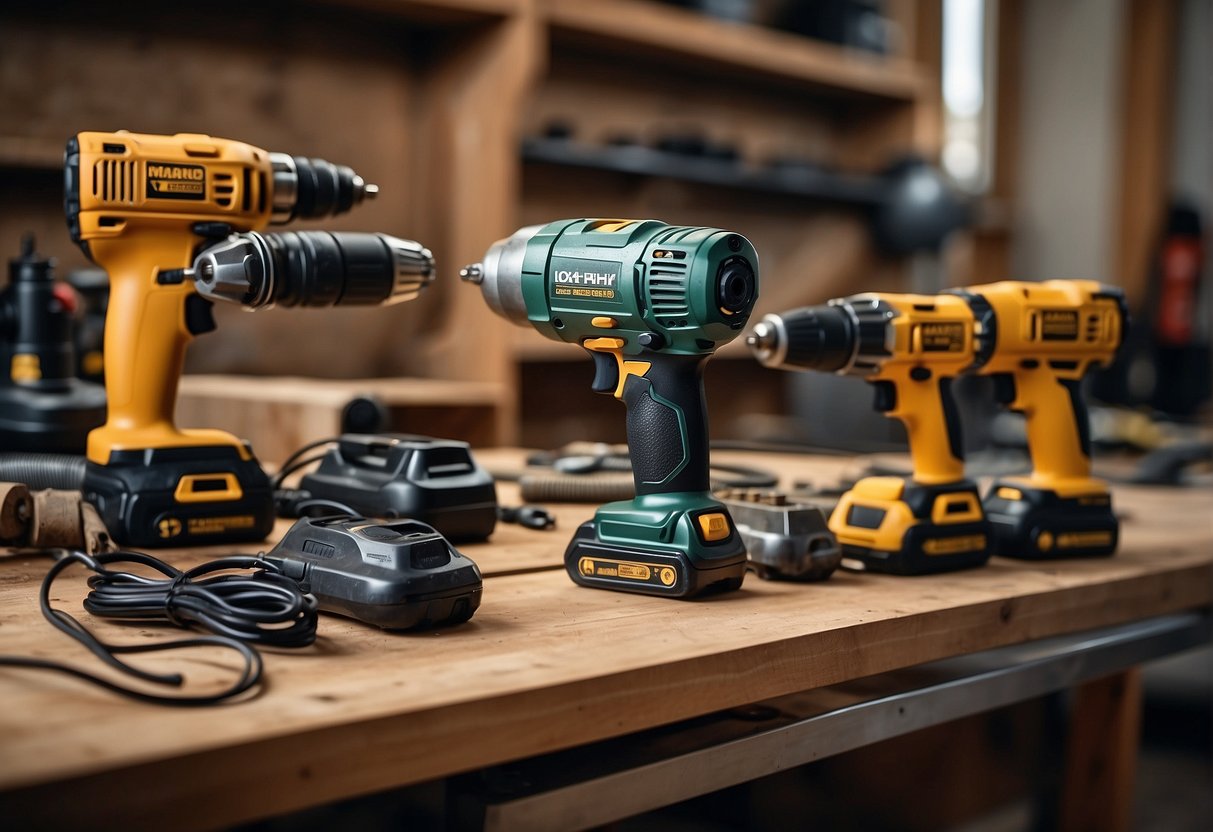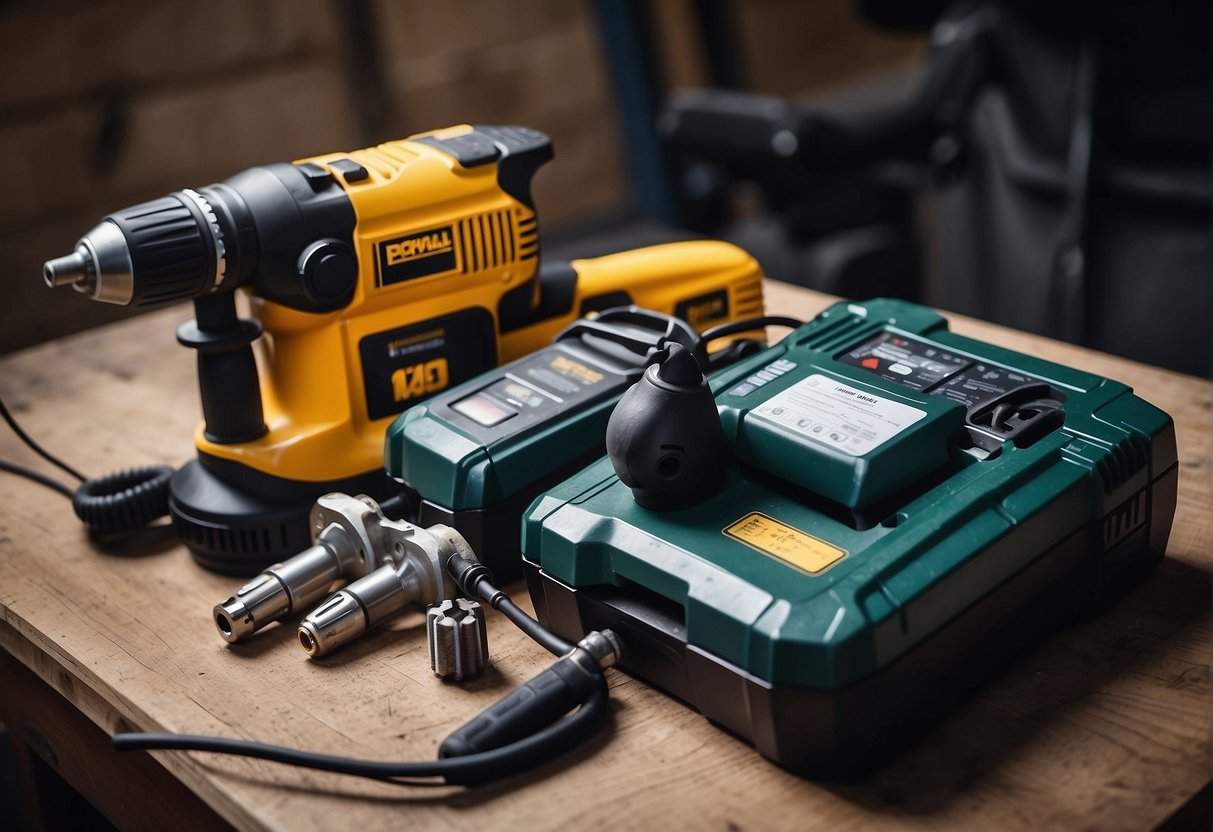Hammer drills are versatile tools that can be used for drilling into concrete, brick, and other hard surfaces. They can also be used for drilling into wood, metal, and plastic. When it comes to choosing a hammer drill, one of the most critical decisions is whether to go for a corded or cordless model. In this article, I will explore the pros and cons of corded and cordless hammer drills, to help you make an informed decision.
Understanding Hammer Drills
Hammer drills are designed to drill into hard surfaces like concrete, brick, and masonry. They work by combining a rotary drill with a hammering action that helps to break up the surface as you drill. This makes them ideal for tasks like installing shelves, hanging pictures, and drilling into concrete for anchors.
Technical Specifications
When choosing a hammer drill, there are several technical specifications to consider, including power, speed, and torque. Corded drills typically offer more power, speed, and torque than cordless drills. This is because they are connected directly to a power source and can draw more power from the outlet. However, cordless drills have come a long way in recent years, and some models can match or even surpass the power and speed of corded drills.
Key Takeaways
- Corded hammer drills offer more power, speed, and torque than cordless models.
- Cordless hammer drills are more convenient and portable, making them ideal for jobsites without access to power outlets.
- When choosing a hammer drill, consider your needs, budget, and the type of work you will be doing.
Understanding Hammer Drills
Design and Mechanism
A hammer drill is a powerful tool that is designed to drill through hard surfaces such as concrete, wood, masonry, metal, stone, and brick. The mechanism of a hammer drill is such that it delivers a hammering action as it rotates, which helps to break through tough surfaces. This is achieved by the drill bit moving back and forth rapidly, creating small impacts that break up the surface being drilled.
Hammer drills come in two main types: corded and cordless. Corded hammer drills are powered by electricity and have a constant power source, while cordless hammer drills are powered by rechargeable batteries and are portable. Cordless hammer drills are generally less powerful than their corded counterparts, but they offer greater flexibility and convenience.
Corded vs. Cordless
When it comes to choosing between a corded and cordless hammer drill, there are several factors to consider. Corded hammer drills are generally more powerful than cordless ones, which makes them better suited for heavy-duty drilling tasks. They also have a constant power source, which means that they can be used for extended periods without needing to be recharged.
On the other hand, cordless hammer drills are more portable and offer greater flexibility. They can be used in areas where there is no power source, making them ideal for outdoor projects or for working in remote locations. They are also generally lighter and more compact than corded drills, which makes them easier to handle and maneuver.
When it comes to drilling through hard surfaces such as concrete, corded hammer drills are generally more effective than cordless ones. This is because they have a higher power output and are able to deliver more force to the drill bit. However, for lighter tasks such as drilling through wood or metal, a cordless hammer drill may be sufficient.
In summary, the choice between a corded and cordless hammer drill depends on the specific needs of the user. For heavy-duty drilling tasks, a corded hammer drill is generally the better choice, while for lighter tasks or for greater flexibility, a cordless hammer drill may be more suitable.
Technical Specifications
When it comes to corded vs cordless hammer drills, there are a few technical specifications that are important to consider. In this section, I will cover the power and torque, speed and performance, and battery and motor technology of both types of hammer drills.
Power and Torque
The power and torque of a hammer drill determine how easily it can drill through tough materials like concrete and metal. Corded hammer drills are generally more powerful than cordless ones because they are connected to a constant source of power. The power of a corded hammer drill is measured in amps, with most models ranging from 5 to 10 amps.
Cordless hammer drills, on the other hand, are powered by a battery, and their power is measured in volts. The higher the voltage, the more powerful the drill. Most cordless hammer drills range from 18 to 20 volts.
When it comes to torque, corded hammer drills tend to have more torque than cordless ones. This is because corded drills have a more powerful motor that can generate more torque. However, some cordless hammer drills now come with brushless motors that can generate more torque than brushed motors.
Speed and Performance
The speed and performance of a hammer drill are also important factors to consider. Corded hammer drills generally have a higher RPM (rotations per minute) than cordless ones, which means they can drill through tough materials faster. Cordless hammer drills, on the other hand, tend to have a slower RPM, but they are still powerful enough to get the job done.
When it comes to performance, both corded and cordless hammer drills can perform well, but corded drills are generally more powerful and can handle tougher jobs. Cordless drills are more portable and convenient, but they may not be able to handle heavy-duty tasks as well as corded drills.
Battery and Motor Technology
The battery and motor technology of a cordless hammer drill are important considerations. Lithium-ion batteries are the most common type of battery used in cordless drills because they are lightweight, long-lasting, and can be recharged quickly. The lifespan of a lithium-ion battery can vary depending on the brand and model, but most can last for several years with proper care.
When it comes to motor technology, cordless hammer drills can have either brushed or brushless motors. Brushless motors are more powerful and efficient than brushed motors, but they are also more expensive. Brushed motors are less expensive and can still provide good performance, but they are not as powerful as brushless motors.
In conclusion, both corded and cordless hammer drills have their advantages and disadvantages when it comes to technical specifications. Corded drills are more powerful and can handle tougher jobs, while cordless drills are more portable and convenient. It ultimately comes down to personal preference and the type of work you will be doing.
Practical Considerations
Size, Weight, and Handling
When it comes to size, weight, and handling, cordless hammer drills have a clear advantage over their corded counterparts. Cordless drills tend to be more compact, lightweight, and easier to handle, making them a better choice for projects that require a lot of mobility and flexibility. On the other hand, corded drills are bulkier and heavier due to the power cord, which can make them more difficult to maneuver and handle.
Convenience and Versatility
Cordless hammer drills offer the convenience of being able to work anywhere without being tethered to a power outlet. This makes them ideal for outdoor projects or for use in areas where there is no access to electricity. Corded drills, on the other hand, are limited by the length of the power cord and require a nearby power outlet. However, corded drills offer more consistent power and are generally more versatile, making them better suited for heavy-duty projects and applications.
Price and Cost Efficiency
Cordless hammer drills tend to be more expensive than corded drills due to the cost of the battery pack. However, they can be more cost-efficient in the long run since they don’t require the ongoing expense of purchasing replacement power cords. Corded drills, on the other hand, are generally less expensive upfront, but the cost of replacing worn or damaged power cords can add up over time.
When it comes to choosing between a corded or cordless hammer drill, there are several practical considerations to take into account. Cordless drills are generally more compact, lightweight, and easier to handle, making them a better choice for projects that require a lot of mobility and flexibility. They are also more convenient since they can be used anywhere without being tethered to a power outlet. However, they tend to be more expensive upfront due to the cost of the battery pack. Corded drills, on the other hand, are generally less expensive upfront and offer more consistent power, making them better suited for heavy-duty projects and applications. Ultimately, the choice between a corded or cordless hammer drill will depend on your specific needs and preferences.
Features and Accessories
When it comes to features and accessories, both corded and cordless hammer drills have similar options available. However, there are a few differences that you should consider.
Drill Bits and Chucks
One of the most important features of any drill is the chuck. A three-jaw chuck is standard on most corded drills, while some cordless models have a quick-release chuck for easy bit changes. Additionally, corded drills often have a larger chuck size, which allows for the use of larger drill bits and accessories.
Masonry bits are essential for hammer drills, and both corded and cordless models can accommodate them. However, it’s important to note that not all drills are created equal when it comes to drilling through tough materials like concrete or brick. If you need a hammer drill for heavy-duty drilling, a corded model with a powerful motor may be your best bet.
Additional Features
Variable speed and a variable speed trigger are common features on both corded and cordless hammer drills. This allows you to adjust the speed of the drill to match the material you’re drilling through. Some cordless models also have controls that allow you to adjust the torque, which can be helpful when driving screws or bolts.
Another feature to consider is a belt clip. Cordless drills often come with a belt clip, which allows you to keep the drill within reach while you’re working. This can be especially helpful if you’re working on a ladder or in tight spaces.
Overall, both corded and cordless hammer drills have similar features and accessories available. When deciding between the two, consider your specific needs and the type of projects you’ll be working on.
Brand and Market Considerations
When it comes to choosing between a corded and cordless hammer drill, it’s important to consider the brand and market offerings. As a professional in the construction or building industry, you want to make sure you have a reliable and durable tool that can handle your work. Here are some top brands and models to consider:
Top Brands and Models
DeWalt
DeWalt is a well-known brand in the power tool industry and offers a range of corded and cordless hammer drills. Their cordless drills are powered by 20V MAX batteries and have high-performance motors that can handle tough jobs. The DeWalt DCD996B is a popular cordless model that boasts a high power output and long runtime. For those who prefer corded drills, the DeWalt DWD210G is a reliable option with a powerful 10-amp motor.
Makita
Makita is another trusted brand in the power tool market and offers a variety of corded and cordless hammer drills. Their cordless drills are powered by 18V LXT batteries and have a range of features, including variable speed control and brushless motors. The Makita XPH07Z is a popular cordless model that delivers high torque and speed. For those who prefer corded drills, the Makita HP1641K is a lightweight and powerful option with a 6.0-amp motor.
Milwaukee
Milwaukee is a brand that is well-known for its high-quality power tools. They offer a range of corded and cordless hammer drills that are designed for professionals and DIYers. Their cordless drills are powered by M18 and M12 batteries and have a range of features, including REDLINK PLUS Intelligence and all-metal chucks. The Milwaukee 2804-20 is a popular cordless model that delivers high power and speed. For those who prefer corded drills, the Milwaukee 5378-20 is a reliable option with a powerful 7.5-amp motor.
Skil
Skil is a brand that is known for its affordable and reliable power tools. They offer a range of corded and cordless hammer drills that are designed for DIYers and homeowners. Their cordless drills are powered by 20V MAX batteries and have a range of features, including variable speed control and LED lights. The Skil HD182002 is a popular cordless model that comes with a 100-piece bit set. For those who prefer corded drills, the Skil 6445-04 is a reliable option with a powerful 7.0-amp motor.
Tacklife
Tacklife is a brand that is known for its budget-friendly power tools. They offer a range of corded and cordless hammer drills that are designed for DIYers and homeowners. Their cordless drills are powered by 20V MAX batteries and have a range of features, including variable speed control and LED lights. The Tacklife PCD04B is a popular cordless model that comes with a 43-piece accessory set. For those who prefer corded drills, the Tacklife PID01A is a reliable option with a powerful 6.0-amp motor.
Choosing the Best Drill for Your Needs
When it comes to choosing the best hammer drill for your needs, it’s important to consider your specific requirements. If you’re a professional who needs a powerful and durable tool for heavy-duty work, a corded drill may be the best option. However, if you’re a DIYer or homeowner who needs a versatile and portable tool, a cordless drill may be a better choice.
Consider the type of work you’ll be doing, as well as the frequency and duration of use. Look for a drill that has the power and speed you need, as well as features like variable speed control and LED lights. Don’t forget to consider the battery life and runtime if you’re opting for a cordless drill.
Overall, there are many factors to consider when choosing between a corded and cordless hammer drill. By considering your specific needs and the offerings of top brands in the market, you can find the best drill for your requirements.
Frequently Asked Questions
What factors should I consider when choosing between a corded and a cordless hammer drill?
When deciding between a corded and a cordless hammer drill, there are several factors to consider. One of the main factors is the type of work you will be doing. Corded drills are generally more powerful and better suited for heavy-duty tasks, while cordless drills are more convenient and portable. Additionally, cordless drills are often more expensive than corded drills, and they require regular battery charging.
How does the power of cordless hammer drills compare to corded models?
Corded hammer drills are generally more powerful than cordless models, due to the consistent electric flow provided by the cord. However, advancements in battery technology have allowed cordless drills to become more powerful and efficient over the years. Some cordless drills even have similar power output to corded models.
What are the primary benefits of using a corded hammer drill over a cordless one?
Corded hammer drills have several benefits over cordless models. They are generally more powerful, more durable, and can handle heavy-duty tasks with ease. Additionally, they don’t require regular battery charging, which can be a hassle with cordless drills. Corded drills are also typically less expensive than cordless models.
How do battery life and mobility in cordless hammer drills affect performance?
Battery life and mobility are important factors to consider when using a cordless hammer drill. The battery life of a cordless drill can affect its performance, as a low battery can cause a decrease in power output. Mobility is also a factor, as cordless drills are more portable and can be used in areas where there is no power source. However, the mobility of cordless drills is limited by their battery life.
What are the typical use cases for corded hammer drills versus cordless?
Corded hammer drills are generally better suited for heavy-duty tasks, such as drilling through concrete or masonry. They are also a good choice for tasks that require a lot of power and torque. Cordless drills are more convenient and portable, making them a good choice for tasks that require mobility or for use in areas where there is no power source.
Can a cordless hammer drill handle heavy-duty tasks as effectively as a corded drill?
Advancements in battery technology have allowed cordless drills to become more powerful and efficient over the years. While corded drills are generally more powerful and better suited for heavy-duty tasks, some cordless drills can handle these tasks effectively. However, cordless drills may require more frequent battery charging and may not be as durable as corded models.

Hi, I’m Sal Muller of Tooltrip.com. My DIY experience led me to understand essential power tools for home projects. Tooltrip.com guides enthusiasts and professionals in choosing right tools for any job. I provide concise top tool reviews for easier, efficient DIY.



